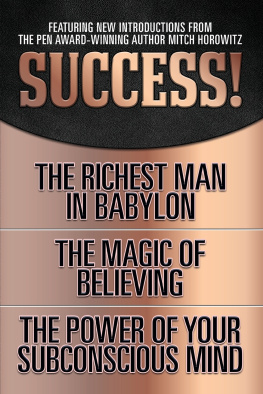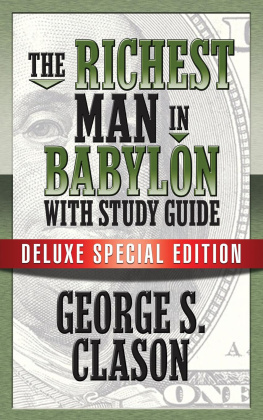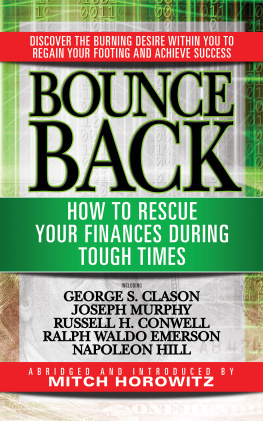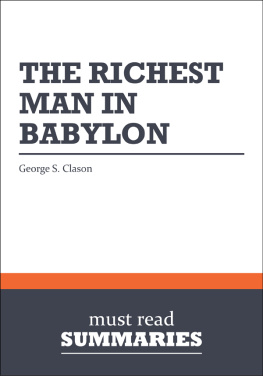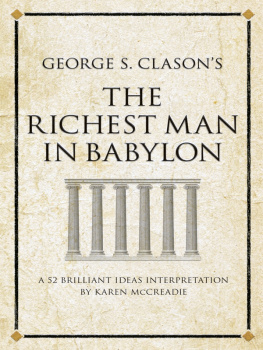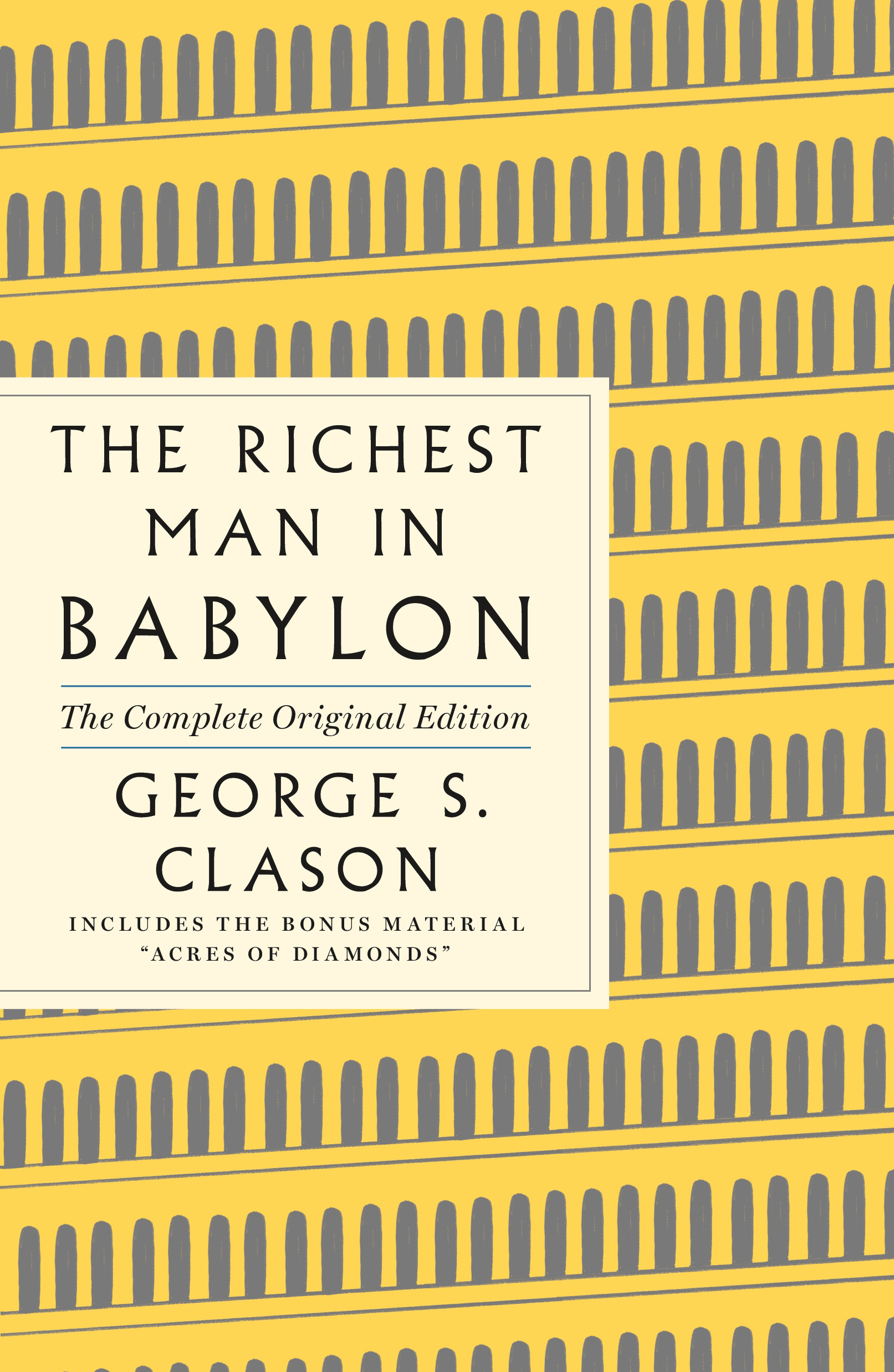Contents
Guide
Pagebreaks of the print version

Pay yourself first.
Youve heard that phrasenow a popular and widely used personal finance principleand it came from the book youre about to read.
The Richest Man in Babylon might be the most famous and powerful book youve never heard of. Even though the book has sold millions of copies since its original publication in nearly one hundred years, and has influenced countless people to live a richer life, its still not as well-known as some of its counterparts, such as Think and Grow Rich by Napoleon Hill and As a Man Thinketh by James Allen. The Richest Man in Babylon, however, is every bit as effective and potent as those classics.
So what is this book you are about to read? Well, The Richest Man in Babylon actually began as a series of pamphlets that author George S. Clason created as a result of the success he experienced in his business. Clason had founded a publishing company, the Clason Map Company, in Denver, Colorado, and is credited with having created the first road map of the United States and Canada (he beat Rand McNally to the market by a year).
His success prompted him to create a series of pamphlets with tips for saving money, planning for the future, and more, which he published and distributed to companies, banks, and other organizations. He collected many of these pamphlets into a book, The Richest Man in Babylon, which he published himself just as the Great Depression had caused many businesses to fail, including Clasons own. The book connected with readers and sold very well, so that Clason was able to live well off of the books success for the rest of his days.
Whats the big deal, you might ask, about a series of pamphlets that gave personal finance advice? Arent there countless other pamphlets and books with financial self-help ideas that have come and gone over the years? Why has this one endured all of these years, and still sells as well if not better than ever?
Clason wanted to share his ideas about wealth-building with others, but he had a unique hook. Instead of writing a dry how-to that could bore readers and quickly become dated, Clason shared his wealth-building tips in the form of parables. These short parables all take place in ancient Babylon. Since they are parables, Clason was able to impart important financial wisdom in a delightful, fun manner. And since the parables are set in ancient Babylon, they have an almost biblical feel to them.
Furthermore, the advice Clason gave was timeless and easy to apply. Consider some of the chapter titles in the book:
Seven Cures for a Lean Purse
Meet the Goddess of Good Luck
The Five Laws of Gold
How could someone who needs advice about money, or is a little down on their luck, not want to read those?
And now its your turn to meet the charming characters of The Richest Man in Babylon, including Bansir, Kobbi, and especially Arkad, the wise teacher. Heres what Ill suggest: at the end of each chapter, pause and reflect on what the main point or points were in the chapter, and consider how they could apply in your own life. In this way, the book will go from something you just read to something that you use.
Weve also included something special in this edition, the full text of Acres of Diamonds by Russell H. Conwell, a well-known minister, orator, lawyer, and writer in the late nineteenth and early twentieth centuries.
Acres of Diamonds is one of the most popular inspirational pieces ever published, and has sold tens of millions of copies since its first publication. Just as The Richest Man in Babylon began its life as a series of pamphlets, Acres of Diamonds began its life as an inspirational speech, inspired by Conwells travels in the Middle East, and first given in 1890. The response was so overwhelming that Conwell was asked to give it again to a new audience, and then again, and again. In fact, he gave the speech a reported 6,152 times in his lifetime. He would often tweak it slightly in various retellings, but the bulk of his main pointsand the inspirational messagealways remained the same.
Acres of Diamonds has a central theme: everything you need is already within you. Like Dorothy in The Wizard of Oz, the reader learns that you dont need to travel to faraway places in search of riches or opportunities. Rather, the metaphorical diamonds are therein abundanceright where you are, waiting for you to use them.
The Acres of Diamonds lecture was so popular that the income Conwell made delivering it was used in a variety of meaningful ways, including the founding of Temple University in Pennsylvania. This one speech, later published as a slim volume, helped to create a university that has taught and educated countless people, and continues to do so to this very day. After Conwells death, the proceeds from Acres of Diamonds were given to a homeless shelter in Philadelphia. What an amazing legacy.
You have before you two timeless tales to teach you, urge you forward, and help you create a lifetime of riches. The messages in these books not only transformed the lives of the authors, but they have transformed the lives of millions of people all around the world for all of these years.
And now you have the opportunity to be inspired by these stories to create your own dreams come true.
Joel Fotinos
CONTENTS
Ahead of you stretches your future like a road leading into the distance. Along that road are ambitions you wish to accomplish desires you wish to gratify.
To bring your ambitions and desires to fulfillment, you must be successful with money. Use the financial principles made clear in the pages which follow. Let them guide you away from the stringencies of a lean purse to that fuller, happier life a full purse makes possible.
Like the law of gravity, they are universal and unchanging. May they prove for you, as they have proven to so many others, a sure key to a fat purse, larger bank balances and gratifying financial progress.
LO, MONEY IS PLENTIFUL FOR THOSE WHO UNDERSTAND
THE SIMPLE RULES OF ITS ACQUISITION
Start thy purse to fattening
Control thy expenditures
Make thy gold multiply
Guard thy treasures from loss
Make of thy dwelling a profitable investment
Insure a future income
Increase thy ability to earn
GEORGE SAMUEL CLASON was born in Louisiana, Missouri, on November 7, 1874. He attended the University of Nebraska and served in the United States Army during the Spanish-American War. Beginning a long career in publishing, he founded the Clason Map Company of Denver, Colorado, and published the first road atlas of the United States and Canada. In 1926, he issued the first of a famous series of pamphlets on thrift and financial success, using parables set in ancient Babylon to make each of his points. These were distributed in large quantities by banks and insurance companies and became familiar to millions, the most famous being The Richest Man in Babylon, the parable from which the present volume takes its title. These Babylonian parables have become a modern inspirational classic.
Our prosperity as a nation depends upon the personal financial prosperity of each of us as individuals.


